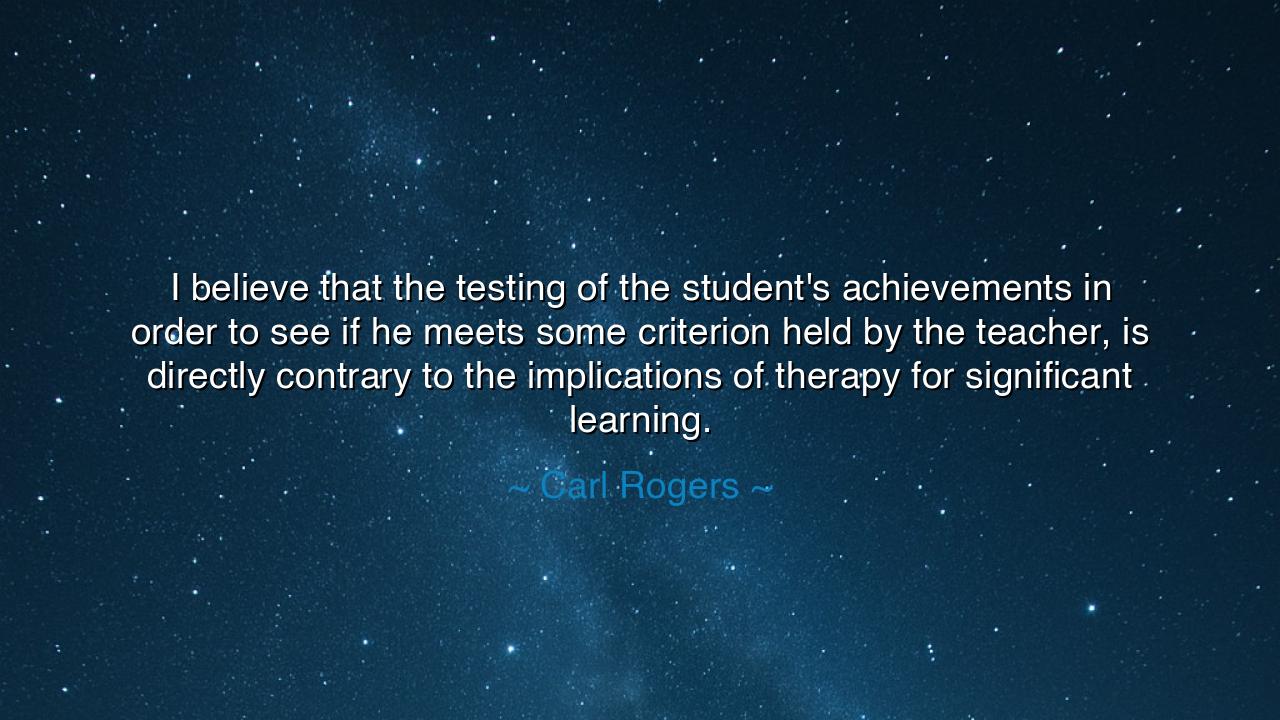
I believe that the testing of the student's achievements in order
I believe that the testing of the student's achievements in order to see if he meets some criterion held by the teacher, is directly contrary to the implications of therapy for significant learning.






“I believe that the testing of the student’s achievements in order to see if he meets some criterion held by the teacher, is directly contrary to the implications of therapy for significant learning.” – Carl Rogers
In this deeply human declaration, Carl Rogers, the great psychologist and pioneer of humanistic education, lifts a lantern to reveal the sacred heart of learning — not as an act of measurement, but as an act of growth. His words strike at the root of what education has too often become: a system of judgment, comparison, and conformity. He warns that when a student’s worth is determined by how well he satisfies a teacher’s criterion, learning ceases to be a journey of discovery and becomes instead a performance born of fear. For significant learning, as Rogers calls it, cannot flourish in the shadow of evaluation; it blossoms only in the light of freedom, curiosity, and trust.
The origin of this insight lies in Rogers’ philosophy of person-centered learning, born from his experiences as a psychotherapist. He observed that true healing in therapy did not arise from authority or instruction, but from empathy — from creating a space where a person felt safe enough to explore their own experience without judgment. When he turned his gaze to education, he saw that students, too, need such a space. The testing of achievement, with its rigid standards and external approval, stifles the spirit. It teaches not self-understanding, but compliance. Rogers believed that just as a person cannot be forced into healing, a student cannot be forced into significant learning — the kind of learning that transforms the mind and the soul.
To test a student is to measure what can be seen — but to understand a student is to awaken what lies unseen. Rogers’s words are a challenge to all who teach: to ask whether they cultivate thinkers or merely test-takers. True learning is not the memorization of knowledge, but the realization of meaning. It is born not in the fear of failure, but in the freedom to wonder. The ancient philosophers knew this well. Socrates, that eternal teacher of Athens, never tested his pupils. Instead, he questioned them until they discovered truth within themselves. His classroom was not a hall of grades, but a dialogue of souls. So too did Rogers believe that the role of the teacher is not to judge, but to guide — to help the learner unfold what already lives within.
Consider the story of Maria Montessori, another revolutionary educator of the human spirit. She, like Rogers, believed that children must learn in an environment free of coercion, where curiosity is the compass and joy is the measure of progress. When her methods were first introduced, they were mocked by traditionalists who clung to rigid examinations. Yet over time, her students — untested, unpressured — grew into independent, creative, and confident adults. Montessori, like Rogers, understood that significant learning happens not through control, but through liberation. The same is true in every field: the scientist who experiments freely, the artist who dares to fail, the philosopher who questions everything — these are the true students of life.
Rogers’s wisdom also reveals a moral truth: that the measure of learning is not mastery, but growth. When a teacher demands that every student meet a fixed standard, they deny the uniqueness of the human spirit. The mind is not a machine to be calibrated, but a seed that unfolds according to its own rhythm. Some minds blossom early; others, later — but all contain within them the potential for brilliance. To impose comparison is to crush the fragile beauty of individuality. True education, therefore, is not the filling of a vessel, but the tending of a garden, where each learner is nurtured toward self-realization.
Yet Rogers’s critique is not one of rejection, but of transformation. He does not condemn structure or guidance; rather, he calls for education to be rooted in compassion, not control. The therapeutic teacher is one who listens more than lectures, who believes in the student’s capacity to learn from within. Such a teacher fosters self-direction, helping students develop not only intellect but emotional wisdom — the ability to reflect, to empathize, to question their own assumptions. In this way, learning becomes not a contest, but a form of awakening.
So let this be the lesson carried forward: do not measure yourself or others by the standards of another’s design. Seek not the approval of the examiner, but the satisfaction of understanding. Teachers, be gardeners of minds, not gatekeepers of ranks. Students, be explorers of meaning, not slaves to marks. When you learn, learn because you are alive, because curiosity burns within you, because truth itself calls to you. For as Carl Rogers teaches, the highest form of education is not to please the teacher, but to awaken the learner.
For in the end, significant learning — the learning that shapes destinies and awakens hearts — cannot be tested, scored, or compared. It can only be lived. It is the kind of knowledge that transforms fear into courage, ignorance into empathy, and silence into song. And those who learn in this way, without chains or conditions, become not merely students — they become creators of the future, and teachers of the soul.






AAdministratorAdministrator
Welcome, honored guests. Please leave a comment, we will respond soon